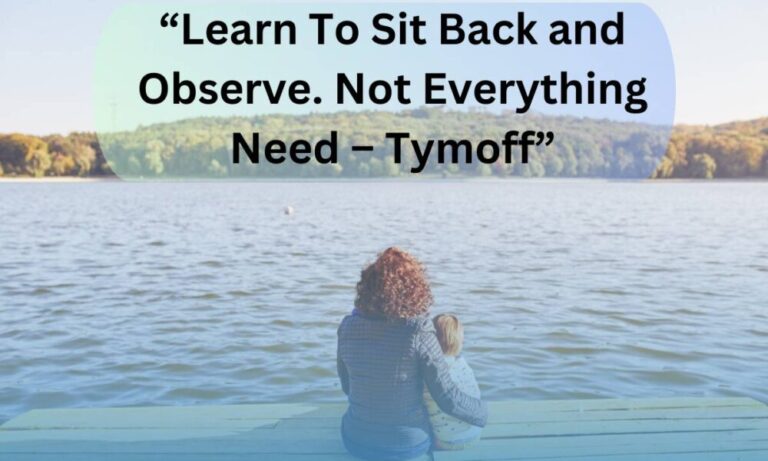In a world that thrives on immediacy and quick reactions, the advice to “learn to sit back and observe. not everything need – tymoff” resonates more than ever. The ability to pause, reflect, and truly observe our surroundings and experiences can lead to deeper insights and more thoughtful responses. This article explores the significance of observation, its benefits, and practical ways to incorporate it into daily life.
The Power of Observation
Understanding What It Means to Observe
To “learn to sit back and observe” is to engage with life intentionally and mindfully. Observation goes beyond mere sight; it involves understanding context, emotions, and underlying motives. By adopting this mindset, we allow ourselves to respond to situations with greater clarity.
Creating Space for Reflection
In our daily lives, we often feel the need to react immediately. However, the truth is that “not everything need” a swift response. Taking a moment to pause can enhance our understanding and lead to more informed decisions. This space for reflection is crucial for personal growth and emotional intelligence.
Benefits of Learning to Sit Back and Observe
Enhanced Emotional Awareness
When we “learn to sit back and observe,” we can better understand our emotions. This practice helps us identify feelings without being overwhelmed by them. By creating a buffer between stimulus and reaction, we can choose how to respond thoughtfully.
Improved Decision-Making
Observation sharpens our decision-making skills. When we take time to assess a situation, we gather more information and consider different perspectives. This thoughtful approach often leads to wiser choices, whether in personal relationships or professional settings.
Stronger Relationships
Practicing observation significantly enhances our interpersonal relationships. By actively listening and being present, we foster empathy and understanding. This approach is especially valuable during conflicts, where taking time to observe can lead to resolution rather than escalation.
Cultivating Mindfulness
To “learn to sit back and observe” is to embrace mindfulness. This practice allows us to be fully present, reducing stress and enhancing our overall well-being. By observing our thoughts and feelings, we can develop a deeper connection with ourselves.
Techniques to Cultivate Observation
Mindfulness Meditation
Mindfulness meditation is an excellent way to “learn to sit back and observe.” This practice encourages you to focus on your breath and your thoughts without judgment. Start with a few minutes each day and gradually increase the duration as you become more comfortable.
Journaling
Journaling can be a powerful tool for observation. Writing down your thoughts and experiences allows for deeper reflection and insight. This practice helps identify patterns in your responses, promoting greater self-awareness.
Active Listening
Active listening is crucial for developing observational skills. When engaged in conversation, focus entirely on what the other person is saying instead of preparing your response. This allows you to observe not just their words but also their emotions and body language.
Nature Walks
Spending time in nature can enhance your ability to observe. Take a walk outside and pay attention to the sights, sounds, and scents around you. This practice encourages you to engage with your environment, promoting a more observant mindset.
Digital Detox
In our tech-driven world, it’s essential to create boundaries with digital distractions. Set aside specific times to unplug from devices and focus on the present. This intentional break allows you to “learn to sit back and observe” your thoughts and feelings without external influences.
Applying Observation in Daily Life
In Professional Settings
In the workplace, the ability to observe rather than react can lead to more effective teamwork and problem-solving. When faced with challenges, take a moment to assess the situation before responding. This strategic approach can lead to better outcomes.
In Personal Relationships
Practicing observation in your personal life can deepen your connections with others. When someone shares their feelings, take the time to listen and reflect instead of jumping in with advice. This simple act fosters trust and understanding.
Self-Reflection
Observation also involves looking inward. Take time to reflect on your thoughts and emotions without judgment. Ask yourself questions like, “What am I truly feeling?” or “Why do I react this way?” This self-reflection can lead to personal growth and increased emotional intelligence.
Also Read: Exploring Carmenton.xyz: A Comprehensive Guide
Conclusion: Embrace the Wisdom of Observation
As you navigate life’s complexities, remember to “learn to sit back and observe. not everything need – tymoff.” This practice can profoundly enhance your emotional well-being and decision-making abilities. By cultivating observation, you can live more thoughtfully and connect more deeply with yourself and others. Embrace the power of observation, and discover how it can transform your interactions and enrich your life.


